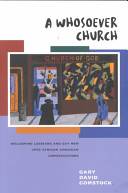A Whosoever Church
Welcoming Lesbians and Gay Men into African American Congregations
Gary David Comstock

‘If new people have trouble with cross-dressing, transgendered, lesbian, or gay people, how do you get them to stay and deal with it rather than leave?’ And ‘Why do you think you have been able to be one of the people who has stood up to the issue of homophobia in the church and to ask the difficult questions?’ Almost all of the responses are very affirming, and these pastors and other religious leaders explain the lengths they go to make sure that lesbian and gay congregants feel at ease and supported. Comstock is also not afraid to challenge these religious leaders. For example, Comstock asks Rev. Amos C. Brown, Senior Pastor of a Baptist church in San Francisco: ‘Would you ever perform a gay marriage in your church?’ Brown responds, ‘To be quite candid, at this point in history, no.’
‘How would a gay man or a lesbian know that they were welcome in your church?’ Comstock asks. Brown then mentioned that the pastor from Metropolitan Community Church, a predominantly gay congregation, was invited to preach at his church. Brown goes on to explain his opposition to same-sex marriage because of the use of ‘traditional terms to affirm a non-traditional lifestyle.’ Comstock asks Rev. Menyweather-Woods: ‘Is homosexuality a sin?’ The minister responds that any sex which is ‘against God’ is a sin. Comstock then asks: ‘How can a gay man or lesbian not be sinful? Do they have to abstain from having sex, or is there a way for them to lead a faithful life?’
Comstock also found that many pastors refused to address the issue of homosexuality for fear that members of the congregation would be offended and leave the church. Other pastors have not had much of a problem with people leaving their congregations, and believe that given time, the congregations came to accept lesbians and gays as fellow congregants because in most instances, ‘the pastor sets the tone.’ However, this is not always the case.
In March 2007 The New York Times reported that for many pastors, accepting lesbians and gays within their congregations meant losing heterosexual congregants.41 According to this article, at one church in Atlanta, after a pastor voiced his support of homosexuals, he saw his membership shrink from 6,000 to 3,000. Comstock does show that there are a number of black church leaders who do work to welcome LGBT people within their congregations and provides hope that the tide of homophobia within the black church may be beginning to change ~ Angelique C. Harris, The Journal of African American History, Vol. 93, No. 2, Discourses on Race, Sex, and African American Citizenship (Spring, 2008), pp. 262-270
Check for it on:
Details
| ISBN | 9780664222802 |
| Genre | Black Interest; Religion & Spirituality |
| Copyright Date | 2001 |
| Publication Date | Apr-01 |
| Publisher | Westminster John Knox Press |
| Format | Trade Paperback |
| No. of Pages | 296 |
| Language | English |
| Rating | Good |
| Subject | African American Clergy/ Interviews; Church Work With African American Gays; Homosexuality; Homosexuality/ Religious Aspects/ Christianity |
| BookID | 14562 |
